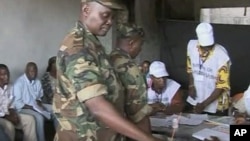The head of Guinea's electoral commission died on Tuesday in Paris, days ahead of the country's second round of presidential elections. He had been sentenced in absentia to one year in prison after being accused of falsifying election results in June's first round. In the meantime, ahead of the elections, clashes broke out between supporters of rival candidates, leaving one person dead and 50 more injured. Campaigning has been suspended but so far the September 19 date for voting still holds.
Tensions are rising in the West African country of Guinea as the second round of presidential elections are approaching. Recent clashes between rival supporters killed one person and injured 50 others. Alexander Lambsdorff is Chief of the European Union's Mission to Guinea.
"In my opinion it's not correct to have inflammatory speeches that use community aspects to inflame the situation," said Lambsdorff.
In the election, Cellou Dalein Diallo, frontrunner, will face off against Alpha Conde. In the first round, Diallo took 44 percent of the vote. Conde was second with 18 percent.
If the election takes place on September 19, it will be the first multi-party presidential vote since the country won independence from France in 1958.
Although passions are running high, coffee vendor Abdoulaye Daffe offers these words of advice.
"We are all parents, we should know how to protect our future," said Daffe. "If you are for someone, you support them as you like but without provoking the others."
Office worker Amara Soumah says the responsibility lies with every Guinean.
"It's up to us. There won't be any violence if we don't want violence. And I think we should avoid this violence at all cost," said Soumah.
In a recent interview, Assistant Secretary of State William Fitzgerald urged calm.
"If there's violence, that is just the wrong signal that Guinea wants to send to the international community," said Fitzgerald. "Now is the time for these two candidates, and we don't care who wins, to put their best platform forward and convince the Guinean people to let these elections take place."
Before campaigning was suspended, Conde and Diallo were making promises.
ALPHA CONDE: "This government will apply the good governance principles and put an end to corruption and more importantly put an end to the mafia gangrenous system infecting our country."
CELLOU DALLEIN DIALLO: "We will carry out financial and technical audits of mining deals to make sure Guinea was not taken advantage of. If Guinea was, we will, of course, review and fix the deal in the frame of calm negotiations with our partners."
In a recent visit to Washington, Guinea's Foreign Minister Bakary Fofana said his country faces challenges, but foremost is allowing democratization to take place.
"I think one of the biggest challenges is going to be for us to respect the outcome of the second round," noted Fofana. "The other big challenge for the next government is how to exploit Guinea's natural resources in order to make the country a growing point that will benefit not only its citizens but also the whole region."
Although election observers say that June's first round of voting was generally free and fair, nearly all of the candidates complained of irregularities. The independent electoral commission has been working to make sure that doesn't happen again.




